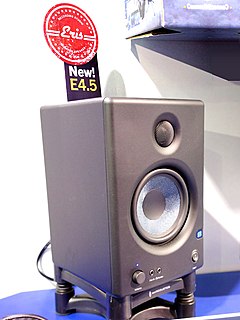History
Founded in 1979, by Peter J Skirrow, the business was named after the home where development and manufacture began, as is so often the case, in garage and spare rooms. Since then it has gone on to become a well-known name in audio and broadcasting, supplying test equipment to broadcasters and studios worldwide, and represented at many professional audio exhibitions.
The LA1 was the first product to be manufactured, and this was rapidly adopted by engineers at Independent Local Radio stations who needed quality testing equipment to ensure that their studios and transmitters met the IBA Code of Practice before they went on-air. It went on to be widely used by the BBC and other broadcasters and studios worldwide. Manufacture of the LA1 ceased with the introduction of the LA100 but it continues to be a sought-after product second hand.
The LA100, launched in 1984, introduced microprocessor controlled 'Sequence testing', with LCD graphic display. A policy of free software upgrades based on feedback from customers resulted in the LA100 becoming a well known and highly regarded product throughout the Broadcast and Professional Audio community. It continues to be manufactured in 2022 and is unusual in that all LA100 units ever made (some now 38 years old!) can still be upgraded to the latest design, even to the point of a 'style upgrade' which replaces the outdated brown and cream case and panel with modern silver and grey versions. In this sense it demonstrated an early approach to the principles of the Waste Electrical and Electronic Equipment Directive (WEEE) that took effect in Europe in 2006.
The MiniSonic MS10, introduced in 2005, is a small low-cost unit with many of the features of the LA100, including sequence testing.
The DigiSonic DS10 provides all the features of the MS10 and LA100 in a software package that runs in Windows on a PC. This requires a sound card, for testing in the analog domain.
The Lindos Test Sheet Database is a web-site that encourages users of Lindos test sets to upload their results for others to see. It is becoming a major source of independent results, for popular devices like the iPod as well as professional equipment.
Lindos Electronics is currently run by the son of the founder, Chris Skirrow, and in addition to making measuring equipment it also specialises in producing accurately calibrated low-cost omnidirectional electret microphones, as well as a low noise preamp and a selection of camera interfaces for both measurement and recording purposes.

High fidelity is the high-quality reproduction of sound. It is important to audiophiles and home audio enthusiasts. Ideally, high-fidelity equipment has inaudible noise and distortion, and a flat frequency response within the human hearing range.

A recording studio is a specialized facility for sound recording, mixing, and audio production of instrumental or vocal musical performances, spoken words, and other sounds. They range in size from a small in-home project studio large enough to record a single singer-guitarist, to a large building with space for a full orchestra of 100 or more musicians. Ideally, both the recording and monitoring spaces are specially designed by an acoustician or audio engineer to achieve optimum acoustic properties.

Ampex is an American electronics company founded in 1944 by Alexander M. Poniatoff as a spin-off of Dalmo-Victor. The name AMPEX is a portmanteau, created by its founder, which stands for Alexander M. Poniatoff Excellence. Today, Ampex operates as Ampex Data Systems Corporation, a subsidiary of Delta Information Systems, and consists of two business units. The Silicon Valley unit, known internally as Ampex Data Systems (ADS), manufactures digital data storage systems capable of functioning in harsh environments. The Colorado Springs, Colorado unit, referred to as Ampex Intelligent Systems (AIS), serves as a laboratory and hub for the company's line of industrial control systems, cyber security products and services and its artificial intelligence/machine learning technology.

Electronic test equipment is used to create signals and capture responses from electronic devices under test (DUTs). In this way, the proper operation of the DUT can be proven or faults in the device can be traced. Use of electronic test equipment is essential to any serious work on electronics systems.

Digital Radio Mondiale is a set of digital audio broadcasting technologies designed to work over the bands currently used for analogue radio broadcasting including AM broadcasting—particularly shortwave—and FM broadcasting. DRM is more spectrally efficient than AM and FM, allowing more stations, at higher quality, into a given amount of bandwidth, using xHE-AAC audio coding format. Various other MPEG-4 and Opus codecs are also compatible, but the standard now specifies xHE-AAC.

Audio system measurements are a means of quantifying system performance. These measurements are made for several purposes. Designers take measurements so that they can specify the performance of a piece of equipment. Maintenance engineers make them to ensure equipment is still working to specification, or to ensure that the cumulative defects of an audio path are within limits considered acceptable. Audio system measurements often accommodate psychoacoustic principles to measure the system in a way that relates to human hearing.
Automotive engineering, along with aerospace engineering and naval architecture, is a branch of vehicle engineering, incorporating elements of mechanical, electrical, electronic, software, and safety engineering as applied to the design, manufacture and operation of motorcycles, automobiles, and trucks and their respective engineering subsystems. It also includes modification of vehicles. Manufacturing domain deals with the creation and assembling the whole parts of automobiles is also included in it. The automotive engineering field is research -intensive and involves direct application of mathematical models and formulas. The study of automotive engineering is to design, develop, fabricate, and test vehicles or vehicle components from the concept stage to production stage. Production, development, and manufacturing are the three major functions in this field.

Automatic test equipment or automated test equipment (ATE) is any apparatus that performs tests on a device, known as the device under test (DUT), equipment under test (EUT) or unit under test (UUT), using automation to quickly perform measurements and evaluate the test results. An ATE can be a simple computer-controlled digital multimeter, or a complicated system containing dozens of complex test instruments capable of automatically testing and diagnosing faults in sophisticated electronic packaged parts or on wafer testing, including system on chips and integrated circuits.
Reliability engineering is a sub-discipline of systems engineering that emphasizes the ability of equipment to function without failure. Reliability describes the ability of a system or component to function under stated conditions for a specified period of time. Reliability is closely related to availability, which is typically described as the ability of a component or system to function at a specified moment or interval of time.
Electronics Manufacturing Services (EMS) is a term used for companies that design, manufacture, test, distribute, and provide return/repair services for electronic components and assemblies for original equipment manufacturers (OEMs). The concept is also referred to as Electronics Contract Manufacturing (ECM).
Synapse Audio Software is a software company located in Germany. Previously known as Sonic Syndicate and headed by Richard Hoffmann, they develop music production software for the Mac OS and Microsoft Windows platforms. They started developing software in November 1998 as Sonic Syndicate and changed their name to Synapse Audio with the release of Orion Platinum in 2002.

Studio monitors are loudspeakers in speaker enclosures specifically designed for professional audio production applications, such as recording studios, filmmaking, television studios, radio studios and project or home studios, where accurate audio reproduction is crucial. Among audio engineers, the term monitor implies that the speaker is designed to produce relatively flat (linear) phase and frequency responses. In other words, it exhibits minimal emphasis or de-emphasis of particular frequencies, the loudspeaker gives an accurate reproduction of the tonal qualities of the source audio, and there will be no relative phase shift of particular frequencies—meaning no distortion in sound-stage perspective for stereo recordings. Beyond stereo sound-stage requirements, a linear phase response helps impulse response remain true to source without encountering "smearing". An unqualified reference to a monitor often refers to a near-field design. This is a speaker small enough to sit on a stand or desk in proximity to the listener, so that most of the sound that the listener hears is coming directly from the speaker, rather than reflecting off of walls and ceilings. Monitor speakers may include more than one type of driver or, for monitoring low-frequency sounds, such as bass drum, additional subwoofer cabinets may be used.

AKG Acoustics is an acoustics engineering and manufacturing company. It was founded in 1947 by Rudolf Görike and Ernest Plass in Vienna, Austria. It is a part of Harman International Industries, a subsidiary of Samsung Electronics.
Audio equipment testing is the measurement of audio quality through objective and/or subjective means. The results of such tests are published in journals, magazines, whitepapers, websites, and in other media.

Universal Audio is an American company that designs, imports, and markets audio signal processing hardware and effect pedals, audio interfaces, and digital signal processing, virtual instrument, and digital audio workstation software and plug-ins.

aptX is a family of proprietary audio codec compression algorithms owned by Qualcomm, with a heavy emphasis on wireless audio applications.
Rohde & Schwarz GmbH & Co KG is an international electronics group specializing in the fields of electronic test equipment, broadcast & media, cybersecurity, radiomonitoring and radiolocation, and radiocommunication. The company provides products for the wireless communications, broadcast & media, cybersecurity and electronics industry, aerospace and defense, homeland security and critical infrastructures.

NTi Audio AG is a manufacturer of test and measurement instruments for acoustics, audio and vibration applications. With headquarters in Schaan, Liechtenstein, the company specializes in end-of-line audio testing for manufacturing quality control purposes, provides instruments for testing public address systems in safety-critical environments and also produces handheld Audio Analyzers and generators aimed at the professional audio industry.

Making Waves (MW) is computer software designed to produce professional quality audio from basic Windows multimedia PCs. This application was among the first of the 16-bit digital sequencers that evolved from the MS-DOS WAV trackers of the Eighties to become the digital audio workstation software available today including Steinberg Cubase, Pro Tools and ACID Pro. Making Waves enabled a small community of independent artists to use existing hardware to record, sample, mix and render their own original work creating professional-quality audio with a modest investment of less than $100. This same dynamic user community played a significant role in the application's development, suggesting program revisions and performing extensive beta testing. These users were all organized and mentored by Stephen John Steele, the original programmer and developer of Making Waves as well as a founding director of Perceptive Solutions, Spacehead Systems and Making Waves Software Limited.
Link Electronics Ltd. was a major UK industrial and broadcast television equipment manufacturer and systems integrator in the 1970s and 1980s. The company was founded by John Tanner and David Mann, who began manufacturing television cameras in 1966.












